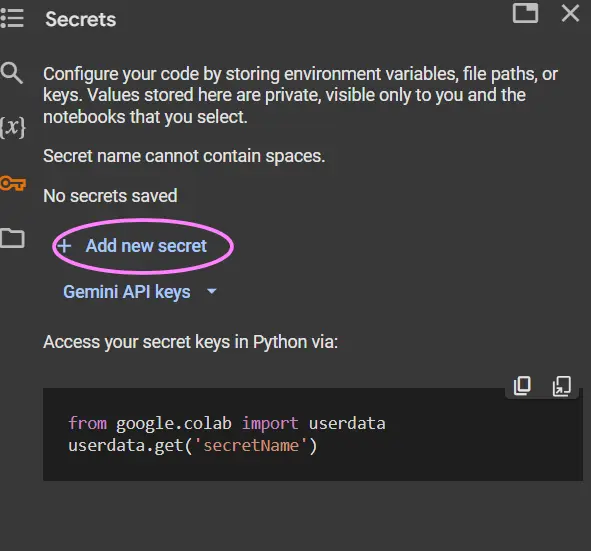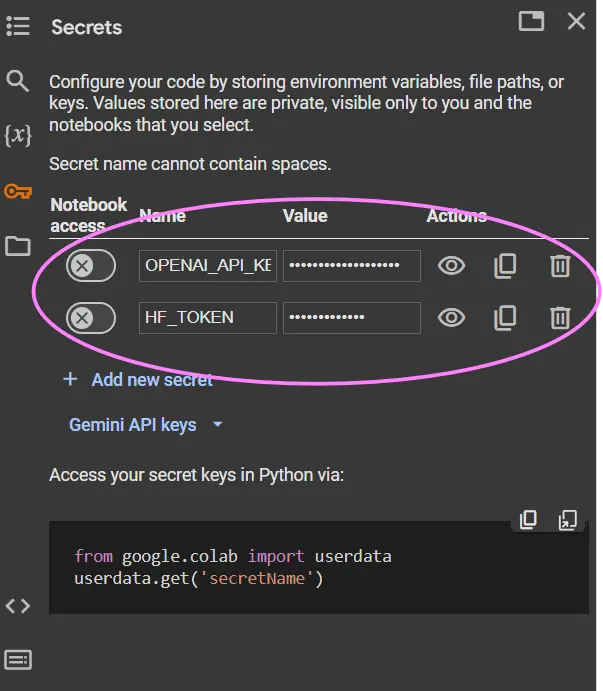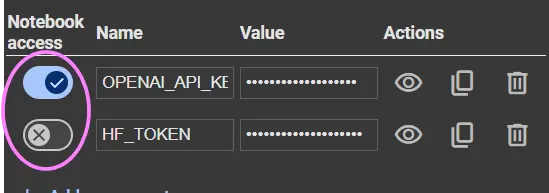Working with APIs in Google Colab is a standard follow for information scientistsresearchers and builders. Nonetheless, dealing with API keys, that are primarily passwords that grant entry to those providers, requires cautious consideration. Straight embedding API keys into your code or storing them as easy setting variables inside your Colab notebooks poses important safety dangers. Google Colab The “Secrets and techniques” characteristic affords a stable answer to this downside, offering a safe and handy option to handle delicate credentials. This complete information delves into the significance of securing API keys, the vulnerabilities of conventional strategies, and an in depth tutorial on utilizing Colab Secrets and techniques successfully.
Studying targets
- College students will be capable to securely retailer API keys and different delicate information utilizing the Google Colab Secrets and techniques characteristic.
- College students will be capable to retrieve and use secrets and techniques saved of their Colab notebooks with out exposing the precise values of their code.
- College students will be capable to combine secrets and techniques as setting variables to be used with libraries that require this authentication technique.
- College students will be capable to apply finest practices for managing secrets and techniques, together with naming conventions, entry management, and safe updates.
This text was revealed as a part of the Information Science Blogathon.
Important Want for API Key Safety
API keys are like digital keys for varied providers, permitting your functions to work together with them. If these keys fall into the unsuitable arms, the implications could be critical:
- Unauthorized entry and use: Malicious actors may use your API keys to entry providers with out your consent, which may incur surprising prices or exceed utilization quotas.
- Information breaches and safety compromises: In some circumstances, compromised API keys may grant entry to delicate information or enable unauthorized modifications to your accounts.
- Reputational injury: Safety breaches can injury your popularity and erode belief amongst customers and stakeholders.
Due to this fact, it’s important to implement sturdy safety measures to guard API keys.
Why use secrets and techniques?
Retailer API keys instantly in your Collaboration notebooks or as commonplace setting variables exposes them to a number of vulnerabilities:
- Exhibition in shared notebooks: If you happen to share your pocket book with collaborators or publish it publicly, your API keys will probably be simply accessible to anybody who views the pocket book.
- Dangers of model management: Submitting notebooks containing API keys to model management techniques like Git can inadvertently expose them to the general public, since these repositories are usually publicly accessible. Even non-public repositories could be weak if entry management shouldn’t be configured accurately.
- Troublesome key rotation: Altering API keys turns into a cumbersome course of if they’re constructed into all of your code. You would need to manually replace every occasion of the important thing, which will increase the danger of errors and inconsistencies.
Introducing Google Colab Secrets and techniques: a safe answer
Google Colab’s Secrets and techniques characteristic addresses these vulnerabilities by offering a safe, centralized option to handle delicate info. That is how safety improves:
- Encrypted storage: Secrets and techniques are encrypted and securely saved on Google servers, defending them from unauthorized entry.
- Granular entry management: You may management which notebooks have entry to particular secrets and techniques, guaranteeing that solely approved notebooks can retrieve and use them.
- With out direct exposition within the code: API keys are by no means constructed instantly into your laptop computer code, eliminating the danger of unintended publicity when sharing or model management.
- Simplified key rotation: Updating an API key is so simple as modifying the key worth within the Secrets and techniques panel. All notebooks that use that secret will mechanically use the up to date worth.
Step-by-step information to utilizing Colab Secrets and techniques
This is learn how to use secrets and techniques in Google Colab:
Step 1 – Entry the Secrets and techniques characteristic
- Open your Google Colab pocket book.
- Within the left sidebar, you may discover an icon that appears like a key. Click on on it to open the “Secrets and techniques” panel.
Step 2: Create a brand new secret
- Click on “Add a brand new secret.”

- Give your secret a pleasant identify (for instance, “OPENAI_API_KEY”). Please observe that the identify is everlasting and can’t be modified later.

- Enter the worth of the particular API key within the “Worth” discipline.
- Click on “Save.”
Step 3: Grant entry to the pocket book
- As soon as the key is created, you will note a swap subsequent to it.
- Make sure that the choice is enabled to grant the key entry to the present pocket book.

Step 4: Use the key in your pocket book
- To retrieve the key worth in your code, use the next code snippet:
from google.colab import userdata
api_key = userdata.get('OPENAI_API_KEY')

- Substitute ‘OPENAI_API_KEY’ with the precise identify of your secret.
- The userdata.get() perform retrieves the key worth as a string. In case your secret is a quantity, you may must solid it accordingly (e.g. int(userdata.get(‘MY_NUMBER’))).
Step 5: Use secrets and techniques as setting variables
- Many Python libraries anticipate API keys to be set as setting variables. You may simply obtain this utilizing the os module:

import os
from google.colab import userdata
os.environ("OPENAI_API_KEY") = userdata.get('OPENAI_API_KEY')
# Now you need to use the API key with libraries that depend on setting variables # Instance: # import openai
# openai.api_key = os.getenv("OPENAI_API_KEY")
Finest practices for managing secrets and techniques
Subsequent we are going to analyze the perfect practices for managing secrets and techniques:
- Significant secret names: Use descriptive and constant naming conventions to your secrets and techniques to simply establish and handle them.
- Periodic entry evaluate: Periodically evaluate which notebooks have entry to your secrets and techniques and revoke entry to notebooks that now not require it.
- Cautious secret updates: When updating an API key, replace the corresponding secret worth within the Secrets and techniques panel. Keep away from deleting and recreating secrets and techniques until completely mandatory.
- Keep away from printing secrets and techniques: By no means print or show the precise secret worth in your pocket book output. It is a essential security precaution.
- Precept of least privilege: Grant entry to secrets and techniques solely to notebooks that completely want them. Keep away from granting broad entry until mandatory.
Conclusion
Utilizing the Google Colab Secrets and techniques characteristic is important to holding your API keys and different delicate info safe. By following the rules outlined on this article, you possibly can considerably scale back the danger of unauthorized entry and make sure the integrity of your initiatives. Implementing these finest practices will contribute to a safer and environment friendly workflow when working with APIs in Google Colab.
Key takeaways
- Direct integration of API keys into Google Colab notebooks poses a major safety danger. Sharing notebooks or committing them to model management can expose these delicate credentials.
- Google Colab’s Secrets and techniques characteristic gives a safe various to storing and managing API keys. Secrets and techniques are encrypted and accessed programmatically, avoiding direct publicity within the code.
- Secrets and techniques could be simply retrieved into Colab notebooks utilizing the userdata.get() perform and built-in as setting variables. This permits seamless use with varied libraries and APIs.
- Following finest practices for secret administration, resembling utilizing pleasant names and periodically reviewing entry, is crucial to sustaining safety. This ensures that solely approved laptops can entry the required credentials.
Regularly requested questions
A. No. Secrets and techniques are saved securely by Google and should not included whenever you share your laptop computer. Others might want to create their very own secrets and techniques with the identical names in the event that they need to run the code.
A. No, the identify of a secret can’t be modified after it has been created. If you happen to want a unique identify, you’ll need to create a brand new secret and delete the outdated one.
A. Merely go to the Secrets and techniques panel, discover the key you need to replace, and alter the worth within the “Worth” discipline. The change will probably be mirrored within the notebooks that use that secret.
A. Whereas there isn’t a explicitly documented restrict, creating an extreme variety of secrets and techniques can influence efficiency. It’s best to handle your secrets and techniques effectively and keep away from creating pointless secrets and techniques.
A. No, deleting a pocket book doesn’t delete the related secrets and techniques. You have to manually delete secrets and techniques from the Secrets and techniques panel for those who now not want them. This is a vital safety characteristic to forestall unintended information loss.
The media proven on this article shouldn’t be the property of Analytics Vidhya and is used on the writer’s discretion.

